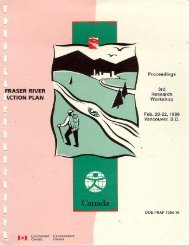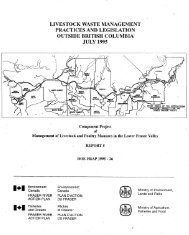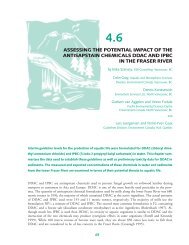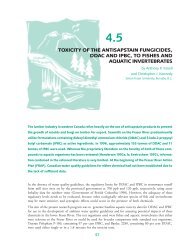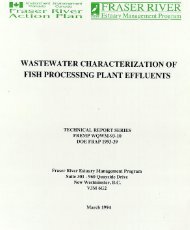9420.pdf
9420.pdf
9420.pdf
Create successful ePaper yourself
Turn your PDF publications into a flip-book with our unique Google optimized e-Paper software.
5.2.4 Contaminant Reduction<br />
Several of the measures recommended for water conservation will also lead to a reduction<br />
of the contaminant loadings. The guiding principle for achieving contaminant reduction<br />
is dry clean-up (segregation of offal and blood from process water).<br />
Overall, the segregation of offal and blood from process water can reduce the organic<br />
loading from a fish processing facility by about 50 to 60 % and even more, depending on<br />
the extent of measures adopted.<br />
5.3 Wastewater Treatment<br />
5.3..1 General<br />
Wastewater treatment options for fish processing plants can be divided into physical,<br />
chemical and biological treatment. Physical treatment options make use of differences<br />
in physical properties between water and contaminants for their separation. Chemical<br />
treatment is generally required to improve removal efficiencies. With the exception of<br />
ultrafiltration (see Section 5.3.6. 1) physical treatment methods cannot remove BOD which<br />
is associated with dissolved substances. This fraction of the overall BOD can be<br />
substantial and can only be removed by chemical and/or biological treatment.<br />
5.3.2 Physical Treatment<br />
Screening is the most prevalent method of physical treatment in the fish processing<br />
industry. Most fish processing plants screen their effluent prior to discharge to a receiving<br />
environment or municipal sewer. The types of screens used include:<br />
. tangential screens (sidehill screens); ,/-<br />
. rotary drum screens with spray water and, in some cases, counter flow helical<br />
brushes for cleaning of screen;<br />
. filter belt screens;<br />
. wheel filters with solids scrappers and warm water spray.<br />
59







